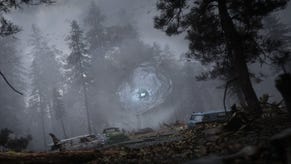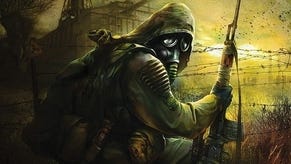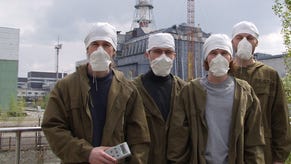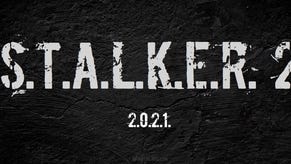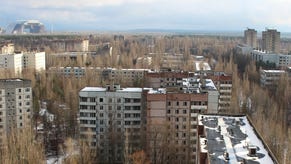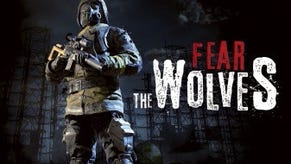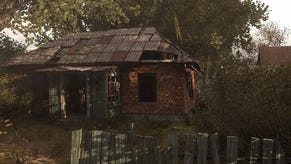S.T.A.L.K.E.R. Call of Pripyat
Inner Pripyat content.
Crawling through a filthy, mutant-infested basement 20 metres below the surface of an irradiated Ukrainian wasteland, clutching a seen-better-days Kalashnikov while my Geiger counter rattles ominously, I stop to wonder why I actually enjoy STALKER so much.
Because, for one thing, it's hideously bleak. Playing more than an hour or so of any of the games in the series is like spending a month in Somerfield. Before long, murdering a total stranger with a hand grenade seems pragmatic rather than craven. He might have a bottle of vodka. Even the most picturesque of sunsets comes tainted with the knowledge that, shiveringly, they mostly come out at night. Mostly.
And that's where something else I don't usually really enjoy comes in: the unremitting terror. It's the noises. The skittering. The lowing. The moans. The snuffling growls which sound like an angry, adenoidal walrus mating at the bottom of a well (another familiar Somerfield experience). They're terrifying.
It's never silent in the world of STALKER. Even during the lulls in action, which are actually much more common than the desperately-fighting-for-your-life bits, there's always the ragged wind and the caws of the wheeling crows providing a unsettling auditory rug, ready to be whisked from underneath your sense of safety by the slightest hint of a grizzle, groan or gunshot.
The sudden snarling of a pseudo-dog, barrelling from cover as I sneak across a pitch-black, anomaly-strewn bluff, is a typically pulse-thrashing moment. 20 seconds later, when the roar of my drum-fed shotgun has abated and the beast lies dead in the clinical glare of my night-vision, I've collected myself enough to rationalise the fact that it's just a dog.
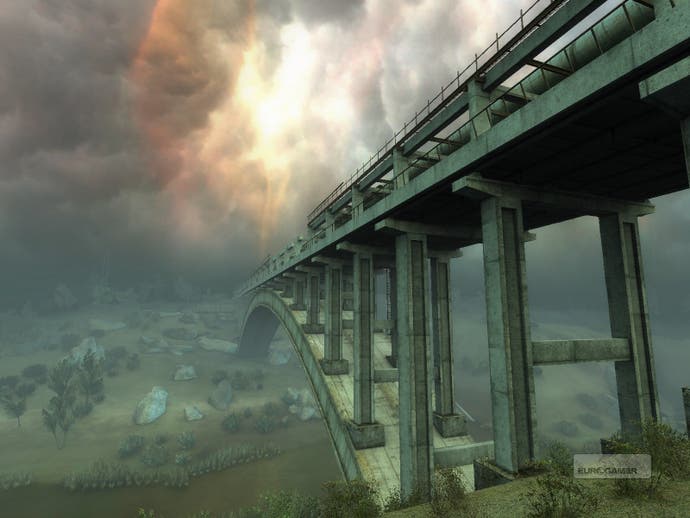
A mutated, highly aggressive dog with the ability to psychically project a pack of terrifying ghost buddies, yes, but a dog nonetheless. In the Zone, this sort of thing is a minor inconvenience, but that doesn't stop me jumping out of my seat.
This tension, crafted so beautifully from the gloomy materials of the game's fractured landscape - its bestial, hypnagogic foes and the tenderly coddled supply of medicine, ammunition and equipment in your backpack - is a part of STALKER so intrinsic that it's become something of a one-word strapline for the series. Atmosphere.
Every dark and foreboding basement, every foetid and festering tunnel, each chattering, Learian, wind-blasted moor is pregnant with the potential for sudden and terrifying action. STALKER's environments seethe with sinister malevolence, despite being largely uninhabited.
The scarcity of foes - when traversing the topside environments, you'll only need your weapon once every few minutes - is completely necessary to this balance. Familiarity breeds contempt, and STALKER's enemies are scattered enough to maintain their mysterious malice, just sneaky and sly enough to make your imagination teem with invisible Bloodsuckers and grim-faced Burer.
Curiously, human on human violence has been toned down considerably for the latest game, Call of Pripyat. The much-vaunted but never perfected system of factions has all but disappeared, reduced to a token discord between the hippy-go-lucky Freedom and their young Republican Duty counterparts.

Even the Bandits have calmed down enormously, chatting away to you and each other for the most part (and dependent upon your actions, of course). It's a strange choice, because often in both Clear Sky and the original Shadow of Chernobyl humans were some of the deadliest foes you would encounter.
There are still plenty of folks with radioactive chips on their shoulders, mind you, and there a few, like the fanatical space-cadet Monolith, who will attack you on sight, but generally the Zone has become an altogether more humanitarian place. If you approach a group of human enemies, even with the telltale red crosshairs and everything, they'll probably just tell you to get lost, warning you to holster your weapon well before they start shooting. Ignore their clemency and you'll soon be choking on a hot lead butty, but it's a definite change of pace.
It works, though. Clear Sky's constant re-zoning and pitched open warfare was too much too deal with and needed reining in, and Call of Pripyat has it pretty much nailed. The A-life system does all it is expected to do, and indeed all it promised as well. Mutants scuffle among themselves and with the regular patrols of STALKERs and bandits who wander around, and dogs or Flesh can often be seen dragging bodies away. Human parties are plentiful, looting corpses and searching for artefacts in the game's large-scale anomalies.
These giant anomalies are pretty much the only place you'll find the valuable, stat-boosting artefacts, which retain their invisibility from Clear Sky and so require detectors to be found. They've evolved from the collections of smaller hazards that they were, too - becoming huge rents in the earth or giant, twisted organic structures glittering with acid or flame. Exploring them with a detector in one hand and a pistol in the other is a tense experience, simultaneously made vulnerable by lack of firepower and proximity to danger.


